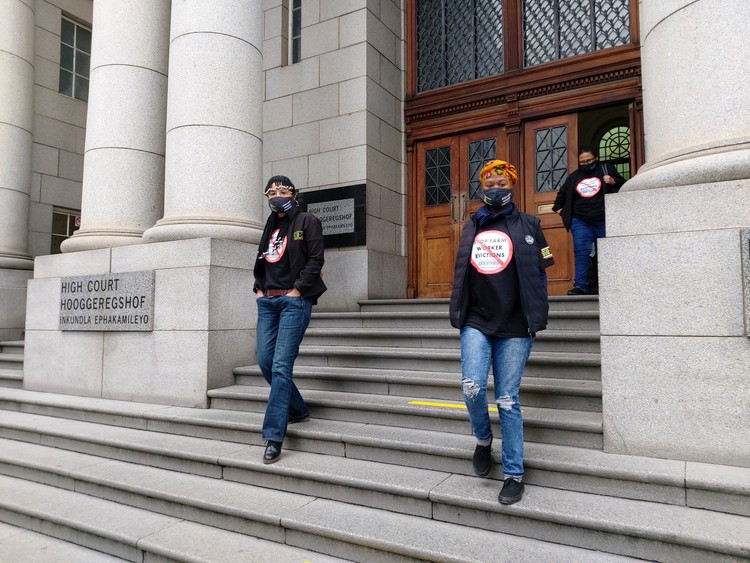
7 August 2020
Co-director Colette Solomon and other members of the Women on Farms Project outside the Western Cape High Court on Thursday for the case against the Drakenstien Municipality’s emergency housing plan. Photo: Liezl Human
There is “very little room” for a court to play a supervisory role over the Drakenstein Municipality’s emergency housing plan, argued advocate Mark Greig, representing the municipality in the Western Cape High Court on Thursday. This was the second day of proceedings in a case between farm dweller Eric Lolo and the municipality.
On Wednesday, advocate Pete Hathorn, for Lolo, asked the court to order the municipality to set out the steps it will take to address its emergency housing crisis.
On Thursday, Greig said Hathorn’s request was “vaguely-framed”, which would make the court’s supervisory role more difficult.
The purpose of the hearing is to examine the lack of adequate emergency housing in the Drakenstein region. However, Greig said that relative to other municipalities, Drakenstein’s housing quota for rural people was “very generous”.
Greig said that the budgets used for projects in Drakenstien were “dependent on the availability and feasibility of a project”. The municipality has also self-funded a number of projects, one of which includes the Drommedaris housing project, which cost R4.2 million, he said.
Greig said frequent land invasions on areas earmarked for emergency housing had also been a recurring challenge. “The municipality has to compromise. There are also other people, who are not evictees, in desperate need of emergency housing in the region,” he said.
“Criticism against the municipality is completely unwarranted since all of the explanations [provided by the municipality] have been dismissed derisively as excuses,” he said.
Advocate Sheldon Magardie, for the Women on Farms Project, who are amicus curiae in the case, explained that in 2013 the municipality allocated R1 million to emergency housing. Soon after, the municipality admitted that there was a humanitarian crisis. Yet in 2016, the municipality again allocated the exact same amount, he said.
“This is no ordinary litigation as it deals with the right of people to have a roof over their heads and feel secure. The municipality has so gravely misunderstood what its duties are … It’s necessary for the court to tell them what their duties are,” said Magardie.
Before adjourning proceedings, Acting Judge Martin said, “The court finds itself in a situation where it is decidedly uncomfortable … without giving time to the matters considered before it with a greater degree of consideration.”
The case is expected to continue on a date not yet confirmed.